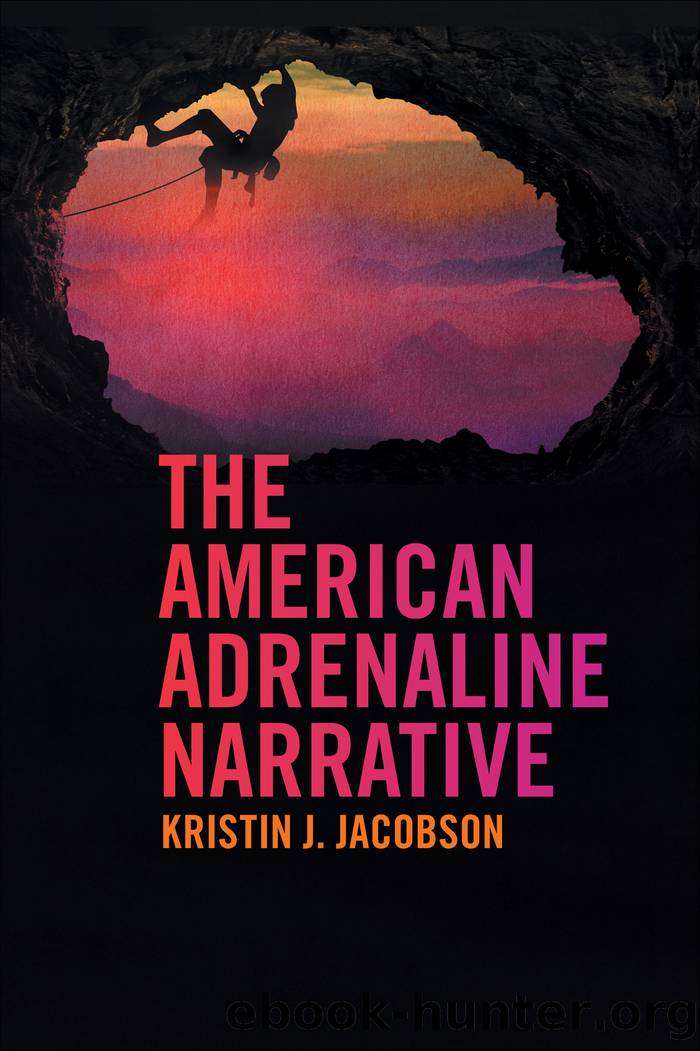The American Adrenaline Narrative by Kristin J. Jacobson

Author:Kristin J. Jacobson
Language: eng
Format: epub
Publisher: University of Georgia Press
Published: 2020-06-14T16:00:00+00:00
Nichols suggests a firm separation between the sea and humans. Steven Callahan also stresses nature’s indifference, but he still assigns nature a female gender as he describes her motivations, or lack thereof. Callahan understands that “she has no wrath to vent. Nor does she have a hand of kindness to extend. She is merely there, immense, powerful, and indifferent. I do not resent her indifference, or my comparative insignificance. Indeed, it is one of the main reasons I like to sail: the sea makes the insignificance of my own small self and of all humanity so poignant.”185 Nature’s indifference reminds Callahan of anthropocentricism’s fictionality: humans are not the center of the universe.
The nonhuman world likely has distinct motivations and perspectives. Thus, while initial research suggests that authors that risk anthropomorphism foster environmental behavior in their readers—“Anthropomorphism fosters conservation behavior, and enhances connectedness to nature”186—we also need to examine the specific iterations of the range of ways to anthropomorphize. McCairen, for example, makes a different observation about mother nature’s indifference as it relates to violence. McCairen states that “I can hardly blame Twenty-five Mile for exacting retribution on men who weren’t wearing life jackets. It’s well known Mother River doesn’t like a smart aleck.”187 McCairen anthropomorphizes nature by giving it (personified as “Mother River”) the power to observe, judge, and punish humans. She also finds that nature does not place humans in a privileged position and especially does not suffer fools.
While McCairen and Callahan personify nature’s indifference differently, both authors advocate for a specific form of critical anthropomorphism: “liminal intimacy,” to use Nimmo’s term.188 Liminal intimacy recognizes and uses the distance between self and other as a means to solve anthropomorphism’s dilemmas. Nimmo explains liminal intimacy as “predicated upon the maintenance of a tension between knowing and unknowing, familiarity and strangeness, in which intimacy consists in respecting, living with and even cultivating distance and alterity, rather than seeking a closeness that would obliterate these; it implicitly recognises the fragility of authentic encounters with the other, and the colonising tendencies intrinsic to proximate intimacy.”189 Liminal intimacy is connection with a distance. Nimmo argues for a greater distance and separation than Morton’s mesh and Alaimo’s trans-corporeality imply.
Jennifer Pharr Davis suggests a shift to liminal intimacy by emphasizing the difference between “walking in” and “walking with” nature: “It took until the end of my journey, but I was no longer walking in nature, I was walking with it.”190 Rather than mix and blur boundaries, liminal intimacy—at least where anthropomorphism is concerned—maintains a critical distance and boundary between self and other. When we examine adrenaline narratives, we see adventurer-authors maintain this critical distance (e.g., Callahan, McCairen, Davis) as well as present a case for more intimate knowledge and relations with nature (e.g., Hahn, Treadwell). Both liminal and blurred representations offer ethical and representational advantages.
The potential for transformation and the nature of the transformation ultimately—whether liminal or blurred—determines the representation’s erotic worth. This view argues for a case-by-case analysis rather than advocating for liminal/blurred as inherently good/bad modes of representing or otherwise engaging the other.
Download
This site does not store any files on its server. We only index and link to content provided by other sites. Please contact the content providers to delete copyright contents if any and email us, we'll remove relevant links or contents immediately.
| African | Asian |
| Australian & Oceanian | Canadian |
| Caribbean & Latin American | European |
| Jewish | Middle Eastern |
| Russian | United States |
4 3 2 1: A Novel by Paul Auster(12364)
The handmaid's tale by Margaret Atwood(7750)
Giovanni's Room by James Baldwin(7319)
Asking the Right Questions: A Guide to Critical Thinking by M. Neil Browne & Stuart M. Keeley(5752)
Big Magic: Creative Living Beyond Fear by Elizabeth Gilbert(5751)
Ego Is the Enemy by Ryan Holiday(5412)
The Body: A Guide for Occupants by Bill Bryson(5077)
On Writing A Memoir of the Craft by Stephen King(4925)
Ken Follett - World without end by Ken Follett(4719)
Adulting by Kelly Williams Brown(4564)
Bluets by Maggie Nelson(4542)
Eat That Frog! by Brian Tracy(4518)
Guilty Pleasures by Laurell K Hamilton(4437)
The Poetry of Pablo Neruda by Pablo Neruda(4090)
Alive: The Story of the Andes Survivors by Piers Paul Read(4017)
White Noise - A Novel by Don DeLillo(4000)
Fingerprints of the Gods by Graham Hancock(3985)
The Book of Joy by Dalai Lama(3970)
The Bookshop by Penelope Fitzgerald(3843)
